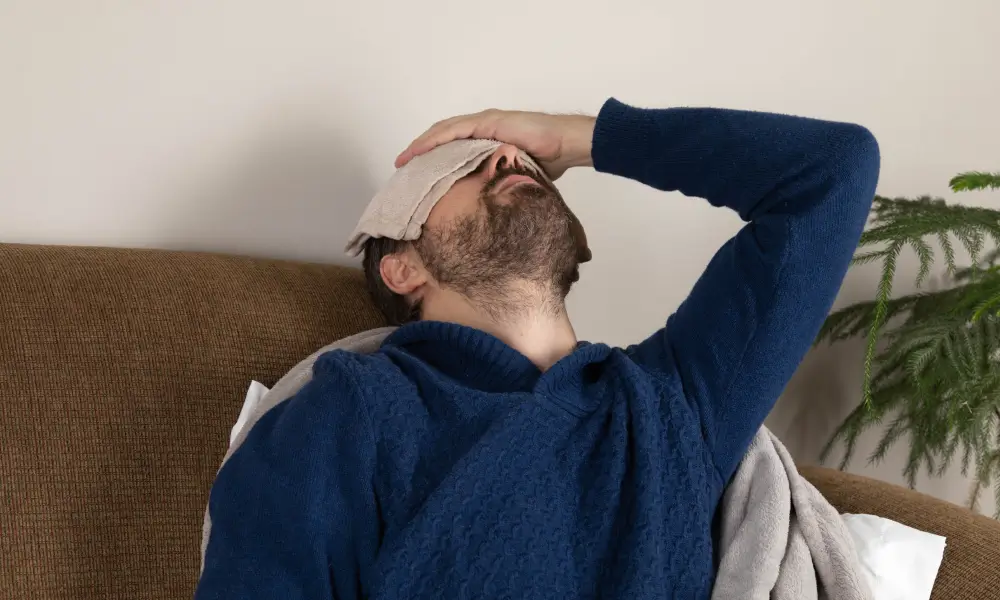Winter Headaches: Causes, Symptoms & Remedies for Cold-Triggered Pain

TABLE OF CONTENTS
Does your head throb more in cold weather? You are not alone. Winter creates the perfect conditions that give many people headaches.
The cold air hits hard. Your blood vessels constrict as you step into chilly weather, and this often causes tension headaches. A warm hat doesn't just keep you cosy—it also helps prevent the pain.
The weather itself packs quite a punch. Research shows that headaches increase as temperatures drop. On top of that, winter storms change the barometric pressure, which can trigger migraines if you are sensitive to these changes.
Life indoors brings its own challenges. Your heating system dries out the air and makes you dehydrated—a recipe for headaches. Keeping windows shut reduces ventilation and sometimes allows carbon monoxide to build up, which gives you even more headaches.
The shorter winter days take their toll. Less sunlight changes your brain chemistry and serotonin levels, which can affect your mood and cause more headaches. The lack of daylight makes some people develop stress headaches.
These factors make it worse:
Reduced physical activity
Holiday-related stress
Changes in eating patterns and sleep routines
Winter allergies triggering sinus issues
January sees the highest number of cluster headaches, which makes winter especially tough for people who suffer from them.
Cold Weather and Blood Vessel Constriction
Winter's icy blast does more than numb your fingers - it affects your brain's functioning too. Cold temperatures force your brain's blood vessels to squeeze tight, a process doctors call vasoconstriction.
Your body reacts in a chain-like sequence. Your brain receives less blood flow. The pressure inside your blood vessels adjusts. These changes often lead to tension headaches that feel like a tight band around your skull.
Cold air impacts more than just your blood vessels. It alters your facial and neck nerves' function and adds to your discomfort. The pain usually hits quickly as you step into the frosty morning air.
Your body feels stressed as you move between freezing outdoor temperatures and warm indoor spaces. This temperature rollercoaster makes your blood vessels expand and contract repeatedly. Headaches become more likely.
Winter headaches typically occur because:
Cold weather increases muscle tension in your neck and shoulders
Your brain's serotonin levels become unbalanced
Blood flow patterns change substantially
Winter storms cause barometric pressure changes
Here's the positive side: You can protect yourself by understanding how cold weather connects to headaches. A simple solution like wearing a hat could prevent these painful episodes by maintaining your head's warmth.
Sinus Headaches vs Tension Headaches in Cold Months
People often experience headaches during winter and blame their sinuses right away. Studies reveal that 90% of people with sinus headache symptoms actually have migraines. This mix-up occurs because these conditions show the same signs.
Genuine sinus headaches stem from sinus infections. The patient's forehead, cheeks and eye areas feel pressure that gets worse with forward movement. This pain comes with nasal congestion, thick discoloured mucus, and occasional tooth pain. Sinus pain differs from other headaches because it shows up after a cold and lasts several days or more.
Winter's cold temperatures make tension headaches more frequent by tightening muscles in the neck and shoulders. This creates a dull ache that feels like pressure throughout the scalp.
Here's how to differentiate between them:
Sinus headaches happen with stuffy noses and a heavy feeling in the face.
Tension headaches involve stiff neck muscles and discomfort that moves into the head.
Dry winter air makes both worse. It irritates the nose and causes sinus trouble. The cold weather stiffens muscles and triggers tension pain.
The season brings additional headache triggers. Holiday preparation stress and less physical activity contribute to muscle tension and discomfort.

Dry Indoor Air and Dehydration Effects
Indoor heating systems create a tricky situation in winter. You get warmth but also deal with headache-inducing dry air. The thermostat settings directly affect your indoor humidity levels. Cold winter air naturally holds less moisture, and heating makes the air even drier.
Your body loses moisture quietly in this dry environment. The mucous membranes in your nose, throat, & eyes become dry. These dried-out membranes can't trap germs effectively, which leaves you more likely to get sick.
Winter headaches and migraines usually stem from dehydration. Research shows that loss of body water may cause your brain to shrink, pulling it away from the skull and activating pain receptors.
Dry indoor air leads to several other health issues:
Irritated, red eyes from a lack of protective tears
Scratchy, inflamed throat
Dry, scaly skin and chapped lips
Earaches from dried mucous membranes
Constipation from overall dehydration
The World Health Organisation reports headaches as the most common nervous system disorder. About half of all adults experience them yearly.
You can protect yourself by drinking 2-3 litres of water daily. A humidifier helps add moisture to your home's air and keeps healthy humidity levels throughout winter.
How to Treat Winter-triggered Headaches at Home
You don't always need to visit a pharmacy to get relief from winter headaches. Several home remedies can help when cold weather triggers pain.
Hydration: Drink 2-3 litres of water daily, as dehydration often leads to winter headaches. Warm soups and herbal teas work great when you don't feel like drinking cold water.
Temperature therapy: A cold compress on your head or neck helps reduce inflammation and constrict blood vessels. A warm compress can relax tense muscles that cause headaches.
Wear proper clothes: The right clothing matters before going outside. A hat, scarf, and layers protect against cold-induced vessel constriction. Moving between indoor and outdoor temperatures slowly prevents sudden headache onset.
Sleep: Sleep patterns play a vital role in preventing headaches. A consistent bedtime schedule, even on weekends, helps maintain your body's natural rhythm.
These remedies work well too:
A humidifier adds moisture to dry indoor air
Deep breathing and meditation help you relax
Regular exercise improves circulation and reduces stress
Staying away from trigger foods like processed meats, chocolate, and alcohol
Natural light exposure maintains healthy serotonin levels
Note that you should see a doctor if headaches become severe or persistent, whatever the season.
When to Visit a Doctor for Recurring Winter Pain
Most winter headaches respond well to home remedies, but professional help might be needed in certain cases. You can avoid unnecessary suffering by knowing the right time to schedule a doctor's appointment.
Seek medical attention if your headaches:
Interfere with your daily activities or affect your quality of life
Continue after taking over-the-counter medicines
Occur more than three times weekly
Require pain medication more than twice weekly
Have increased in frequency
Wake you from sleep
Get progressively worse over several weeks
Winter headaches need extra caution in older people, as cold weather can trigger blood pressure fluctuations that might lead to serious conditions.
A headache diary can be invaluable. Your doctor can diagnose your condition accurately when you track symptoms, frequency, and triggers.
You should seek emergency care if your headache comes with fever, vomiting, confusion, neck stiffness, blurred vision, balance problems, or seizures. These symptoms could indicate a condition that needs immediate medical attention.
Note that headaches affect almost everyone at times, but professional evaluation becomes essential when they disrupt your normal activities or work life. Your doctor can develop a treatment plan that targets your specific winter headache pattern.
FAQs
Why do I get headaches more often in winter?
Cold temperatures make your head's blood vessels constrict and this often triggers pain. Winter storms change barometric pressure, which many headache sufferers find problematic. Research shows a clear link between seasonal changes and headache frequency. People sensitive to temperature changes experience more headaches in winter. Your serotonin levels change with shorter days. Indoor heating creates dry air that can dehydrate you—another trigger for headaches.
Can dry indoor air cause headaches?
Yes! Your nasal passages become parched and inflamed from dry indoor air. Research shows this dryness can trigger sinus headaches. The humidity drops when you run indoor heating. This makes your mucus membranes dry out and crack. The pain comes directly, and inflammation can restrict normal blood flow through your sinus cavities.
Are sinus headaches more common in winter?
Studies show sinus problems increase by a lot during the winter months. Winter's dry air makes your mucus thicker, so your body struggles to clear bacteria. But the majority of people who think they have sinus headaches actually experience migraines.
What is the best way to relieve a winter headache at home?
Drink plenty of water! Here are other helpful remedies:
Use a humidifier to add moisture to dry indoor air
Apply cold or warm compresses based on your headache type
Practice relaxation techniques like deep breathing
Keep regular sleep patterns
Should I be concerned about recurring winter headaches?
You should see a doctor if headaches disrupt your daily life, get worse over time, or come with other symptoms like fever or confusion. A headache diary helps your doctor spot patterns and triggers.






